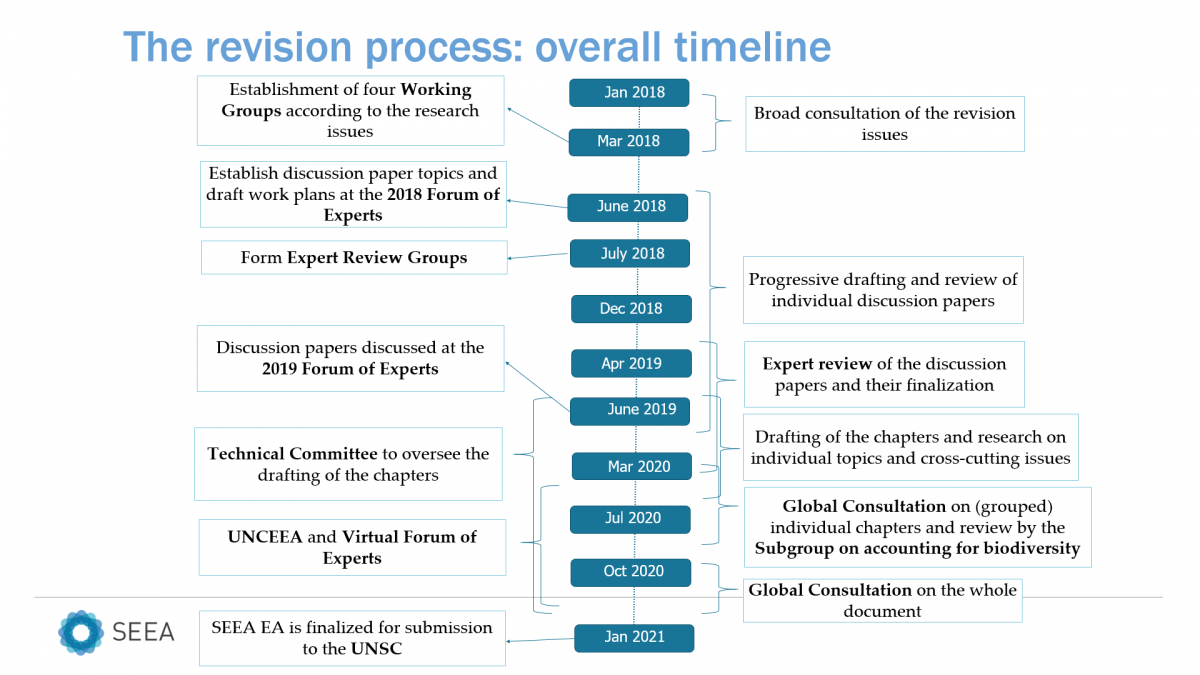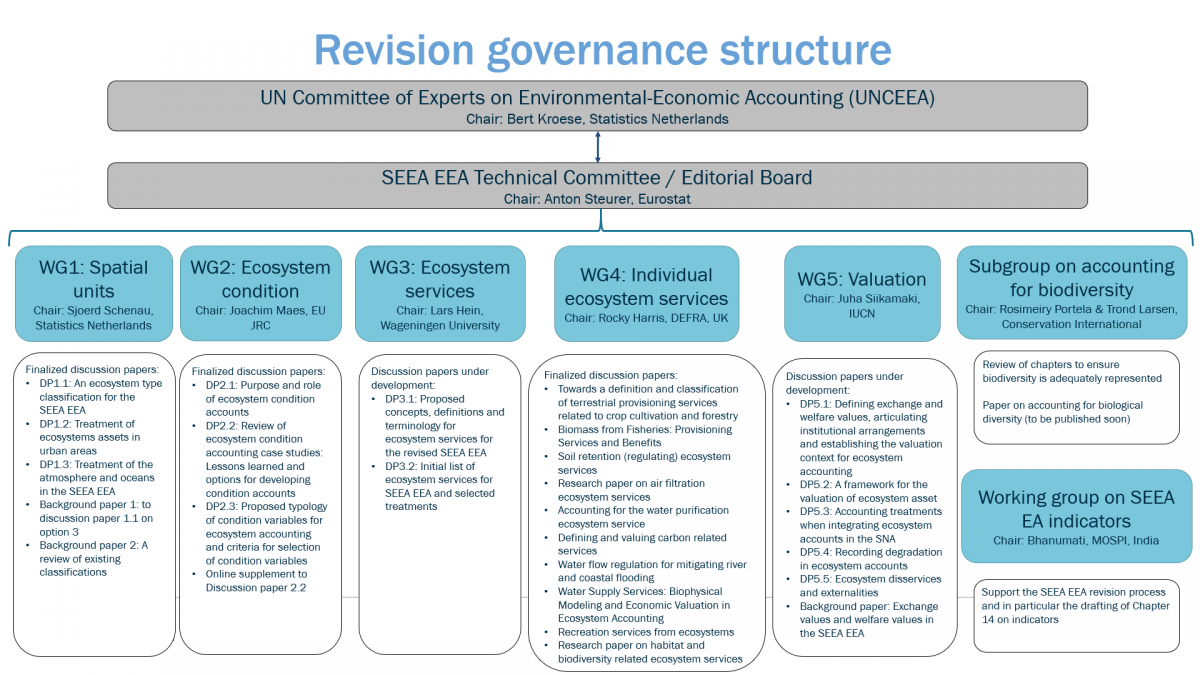SEEA Experimental Ecosystem Accounting Revision

In March 2013, the United Nations Statistical Commission endorsed the System of Environmental-Economic Accounting – Experimental Ecosystem Accounting (SEEA EEA) as the basis for commencing testing and further development of this new field of national accounting. The SEEA EEA was formally published in 2014 as a joint publication of the United Nations, European Commission, Food and Agriculture Organization of the United Nations, Organisation for Economic Co-operation and Development and the World Bank.
Given the level of interest, testing and experimentation, the body responsible for the development and advancement of the SEEA, the UN Committee of Experts on Environmental-Economic Accounting (UNCEEA), following the decision of the United Nations Statistical Commission from March 2017, determined in June 2017 that a revision of the SEEA EEA drafted in 2012 was appropriate with the intention to reach agreement on as many aspects of ecosystem accounting as possible by 2020. This revision process has now commenced and is based on the SEEA EEA endorsed in 2013, the experiences of the many initiatives on ecosystem accounting in practice, and on the Technical Recommendations in support of the SEEA EEA 2012.
As customary when launching a revision process, issues that remain unsolved and need to be addressed have been identified. A list of issues has been developed through discussions at the June 2016 and June 2017 meetings of the UNCEEA and the October 2017 meeting of the London Group on Environmental Accounting. The current list has been endorsed by the SEEA EEA Technical Committee, the working group under the auspices of the UNCEEA that is overseeing the revision process. Please consult the Revision Issues Note for details on the revision issues and the preliminary outline of the revised SEEA EEA (from September 2018).
The SEEA EEA revision has been co-financed from contributions by Australia (Australian Bureau of Statistics and Department for Environment and Energy), the United Kingdom of Great Britain and Northern Ireland (Office of National Statistics and Department for Environment, Food and Rural Affairs), and the European Union (Eurostat).
Revision progress description
The SEEA EEA Revision was officially launched in March 2018 at the 49th session of the United Nations Statistical Commission. In June 2018, approximately 100 experts gathered for the 2018 Forum of Experts on SEEA Experimental Ecosystem Accounting. Since the Forum, five working groups have been focusing on advancing the four research issues identified as priority areas for the SEEA EEA revision – spatial areas, ecosystem condition, ecosystem services and valuation. Each of the groups have now drafted a set of discussion papers that were reviewed by a group of expert reviewers. Most of the discussion papers were finalized in time for the 2019 Forum of Experts in June 2019 where they were further discussed by a broader community of experts. All together 26 discussion and background papers were drafted that involved over a 100 experts, and now serve as the bases for drafting of the chapters of the revised SEEA EEA. The draft chapters of the revised SEEA EA were first submitted to review in the first global consultation on the individual chapters between March and August 2020. The complete draft of the SEEA EA was distributed for the global consultation on the complete draft in October 2020. The final draft was submitted to the United Nations Statistical Commission for discussion at its 52nd session in March 2021.
Please access the final documents as submitted to the UN Statistical Commission here: (1) the final draft of the SEEA EA; (2) the revision process note; and (3) the Summary of feedback and responses to the Global Consultation on the complete draft of the SEEA EA.
Timeline
The below figure indicates the overall timeline of the SEEA EEA revision.

Governance structure
The below figure shows the governance structure, the various groups and products.

Sub-pages dedicated to specific topics
Global consultation on individual chapters
Draft chapters of the revised SEEA EEA will be progressively distributed in batches covering related topics with a commenting period lasting approximately 6 weeks. The comments received will be made public on this website, which will continue to serve as a repository of the technical papers prepared during the revision process, presentations and minutes of meetings. All comments on the chapters should be provided using the accompanying comments form. Please find the relevant documents related to the global consultation:
- Letter from Mr. Stefan Schweinfest, director of the United Nations Statistics Division, initiating the first global consultation of individual chapters for the revision of the SEEA EEA
- Cover note describing the revision process and its timeline as well as a general overview of the SEEA EEA
See more details and find the review chpaters here.
Work on the research areas
Five working groups were established to work on the four research areas - spatial units, ecosystem condition, ecosystem services, and valuation - of the SEEA EEA revision. The working groups involved a wide range of experts from various communities, and drafted 26 discussion and background papers to support the revision process. More information on the working groups and their outputs can be found here.
There are five working groups that were created under the SEEA EEA revision:
- Working group 1 on spatial units
- Working group 2 on ecosystem condition
- Working group 3 on ecosystem services
- Working group 4 on individual key ecosystem services
- Working group 5 on valuation and accounting treatments
Accounting for biodiversity
A key area of interest is on the potential for the SEEA to support policy and decision-making concerning the conservation and enhancement of biodiversity at levels other than ecosystems. There is widespread agreement that the SEEA is a useful framework to measure biodiversity, however, there exist a variety of perspectives on how the SEEA can better reflect the measurement of biodiversity throughout the framework. A broader discussion to close the gap in understanding between the statistics/accounting, economics and biodiversity community is ongoing.
See more on accounting for biodiversity here.
Ecosystem Accounting Indicators
Information from ecosystem accounts and related accounts can be organized and integrated to provide policy-relevant indicators and aggregates and contribute to global monitoring framework and a range of other indicator frameworks and applications. To guide whis work a Working Group on SEEA Ecosystem Accounting (SEEA EA) Indicators was established. For more information on the Working Group see here.
